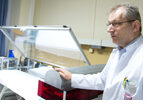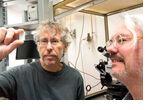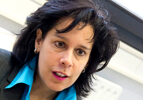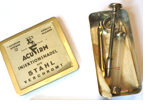RESEARCH & SCIENCE
 NEURODERMATITIS
NEURODERMATITISBlue light therapy can allay inflammation
There is hope for people suffering from neurodermatitis: PD Dr. Detlef Becker, senior physician at the Department of Dermatology at the Mainz University Medical Center, has achieved fantastic results with photodynamic therapy, a treatment with blue light. But it is expensive and the statutory health insurance does not cover it. A new clinical study shall provide reliable data on the efficacy of the method.
 COMPUTER SCIENCE
COMPUTER SCIENCEResearch at the interface of disciplines
Thirty years ago the first Professor of Computer Science was appointed at Johannes Gutenberg University Mainz (JGU). A lot has since changed in this relatively recent field. This special anniversary is a good reason to take a quick look back, despite the fact that the professors at the Institute of Computer Science prefer to talk about their current work and projects. After all, the present and future are far more interesting to them than a brief history of their discipline.
 BIBLICAL ARCHAEOLOGY COLLECTION
BIBLICAL ARCHAEOLOGY COLLECTIONThe Tower of Babel in the basement
Hardly any other collection of Johannes Gutenberg University Mainz (JGU) can boast as many unique pieces. Models represent life in Biblical times, ten thousand photos and valuable maps document the early history of Israel while seven ossuaries evidence a turning point in burial practices at the time of Christ. The Biblical Archaeology Collection may be relatively new but it goes way back into ancient history.
 INDOLOGY COLLECTIONS
INDOLOGY COLLECTIONSBuddha’s nose and good fortune
The collection is small but impressive: the bequest of Ursula Walter has found a home at the Institute of India Studies at Johannes Gutenberg University Mainz (JGU). Indian gods and Buddhas, various everyday objects, and fine votive offerings for the temple can be found here. Part of the collection is on display in the Philosophicum building, but most of it languishes in a nondescript gray metal cabinet at the institute.
 BESSEL RESEARCH AWARD
BESSEL RESEARCH AWARDNew neurons for the brain
Dr. Alejandro F. Schinder of the Inst ituto Leloir in Buenos Aires has received a Friedrich Wilhelm Bessel Research Award granted by the Humboldt Foundation for fundamental research that has provided important insight into how new nerve cells are incorporated in the adult brain. The presentation of the award has set in motion a joint international project and Professor Benedikt Berninger of the Research Center Translational Neurosciences at the Mainz University Medical Center intends to cooperate closely with his Argentinian colleague over the next years.
 RESEARCH TRAINING GROUP
RESEARCH TRAINING GROUPOvercoming barriers in order to scrutinize limits
The new research training group 'Life Sciences, Life Writing: Extreme Experiences of Human Life between Biomedical Explanations and Life Experiences" attempts to bridge the gap between the natural-medical sciences and the humanities. The German Research Foundation is providing almost EUR 2 million to support this unusual project at Johannes Gutenberg University Mainz (JGU).
 ICECUBE
ICECUBEHunting neutrinos in the Antarctic
Over the past three years, the IceCube neutrino observatory at the South Pole has managed to detect extreme high energy neutrinos originating from the depths of the universe. Even experts doubted for a long time whether the idea would work, but reports of success came in 2013. Professor Lutz Köpke of the Institute of Physics at Mainz University and his work group are involved in the international research project.
 ORIENTAL STUDIES
ORIENTAL STUDIESThe world of Turkic peoples epitomized in books held in Mainz
There is almost no other university that can boast such a treasure: The library for Turkic Studies of the Department of Oriental Studies at Johannes Gutenberg University Mainz (JGU) has an enormous variety of works covering the languages and cultures of the Turkic peoples; some 50,000 volumes are available. Junior Professor László Károly knows it well. He guides through the labyrinth of bookcases to where some remarkable volumes are kept.
 MEDICAL HISTORY COLLECTION
MEDICAL HISTORY COLLECTIONWhen the life awakener was used to fight arthritis
There is a small but fine collection of various historical medical objects in the library of the Institute of History, Philosophy, and Ethics of Medicine of the Mainz University Medical Center. Professor Norbert W. Paul knows his way around here. The Director of the Institute tells some of the stories that lie behind the exhibits.
 ANTHROPOLOGY
ANTHROPOLOGYCattle, milk, and Europeans
With their ar ticle on "The milk Revolution," Professor Joachim Burger and his work group at the Institute of Anthropology at Johannes Gutenberg University Mainz (JGU) managed to catapult themselves into the media headlines. But milk in fact only represents an incidental aspect of their research. Their real concern is the history of the settlement of Europe.
